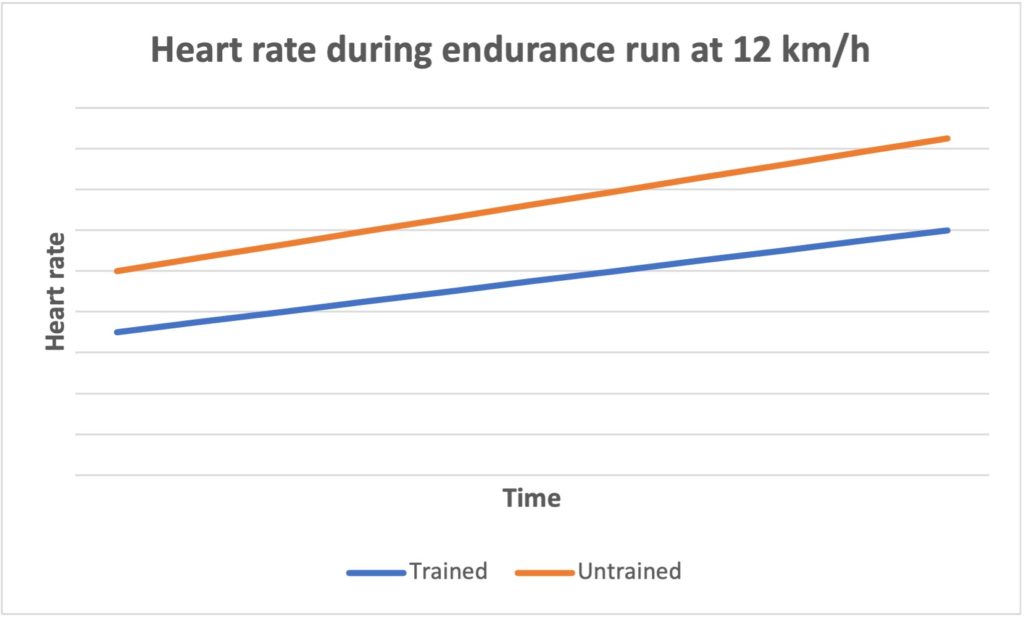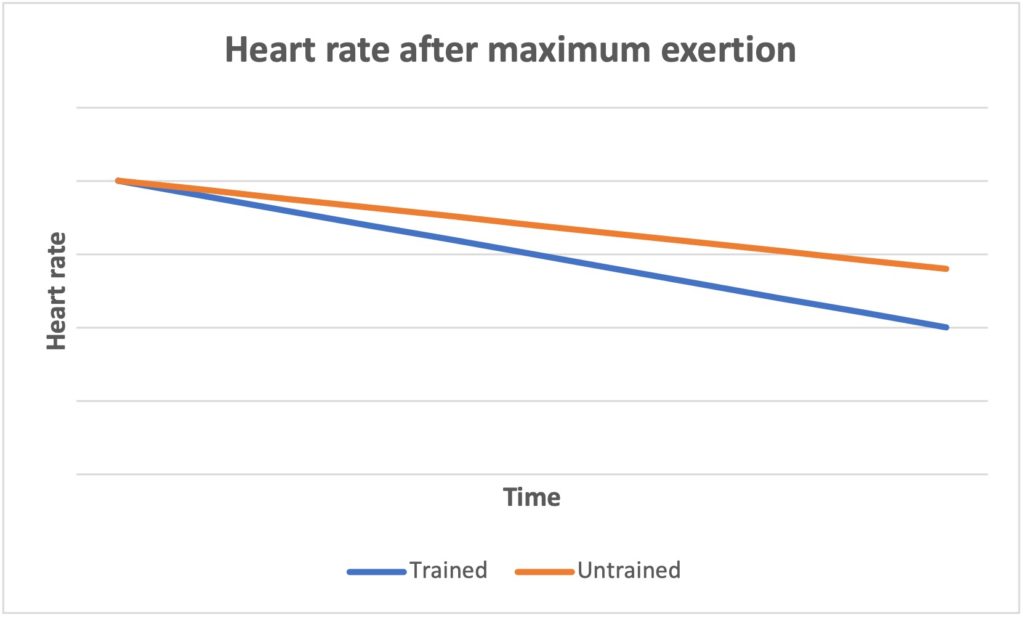In short, the tips for lowering your heart rate are: 1) running at a slower pace, 2) taking slow deep breaths, 3) drinking enough water, and 4) not taking stimulants beforehand.
Table of Contents
- Why does your heart rate rise while running?
- Why doesn’t your heart rate keep increasing while running?
- Lowering your heart rate while running
- How do you lower your heart rate in general?
- What does your heart rate say about your fitness?

Why does your heart rate rise while running?
If you are going to run faster or run for a longer period, your muscles will need more oxygen and have to remove more waste. This logically takes place through the blood supply.
First of all, there will be a redistribution of the blood while running; a larger percentage of the blood goes to the muscles and a smaller percentage to the digestive system, among other things.
To increase the supply of blood to the muscles, the heart has to work harder. On the one hand, the heart rate will increase (the number of contractions per minute that the heart makes) and on the other hand, the stroke volume will increase (the volume of blood that leaves the heart per beat).
But how are the heart rate and stroke volume increased?
This is done by the autonomic nervous system. The autonomic nervous system consists of the sympathetic nervous system (SNS) and the parasympathetic nervous system (PNS). The SNS increases the heart rate and stroke volume, while the PNS decreases the heart rate. During increasing exertion, the SNS becomes more and more active and the PNS becomes less and less active.
This is why the heart rate rises while running; it is a natural process to supply sufficient blood to the muscles and it’s controlled by the autonomic nervous system.
An important feature of the autonomic nervous system is that it regulates functions that take place unconsciously; in principle, you cannot influence the processes that take place. This would mean that you cannot lower your heart rate while running at all, but this is not entirely true. There are a few methods that can work, we’ll share them in a moment.
Why doesn’t your heart rate keep increasing while running?
Most of you will be aware that your heart rate does not continue to increase while running. We have something called a maximum heart rate. Reaching your maximum heart rate will correspond to the feeling of maximum exhaustion. During an endurance run, most will run at a certain percentage of the maximum heart rate.
But why do we actually have a maximum heart rate?
Earlier we talked about the blood supply to your muscles, but it’s important to realize that your heart also needs blood. When the heart is contracting (systole), very little blood can get to the heart. The main blood supply to the heart, therefore, occurs when the heart is relaxed (diastole).
As the heart rate increases, the heart becomes shorter and shorter in a relaxed state and the time in which blood can flow to the heart becomes shorter. This ultimately forms the barrier to the heart rate to rise further.
Many people will be familiar with the ‘standard method’ for determining the maximum heart rate; 220 minus your age. Although this gives a nice estimate it is often very inaccurate; many factors determine the maximum heart rate.
Do you want to determine your maximum heart rate?
Then I would determine this yourself in practice. You can do this, for example, with the help of a shuttle run test. This is a test in which the speed is increased more and more until you can no longer sustain it. After this test, wait a few seconds and then measure your heart rate; this heart rate gives a good indication of your maximum heart rate.
Lowering your heart rate while running
Although your heart rate is not under your conscious control, there are several ways to lower your heart rate while running. We will now discuss these ways.
- Run at a lower speed:
Running at a lower speed is of course quite self-explanatory. If you run at a slower speed, your muscles will need less blood; this can lower the heart rate. This is a useful technique, especially if your goal is to run at a certain percentage of the maximum heart rate. You can correct your speed in such a way that you can maintain this heart rate.
- Take slow deep breaths:
This is of course not easy while running, but it is an effective method to lower the heart rate. It leads to more activation of the parasympathetic nervous system, and as we have seen before, it lowers the heart rate.
In a study[1] by M.A. Russo, it was found that slow breaths lead to more venous return of blood to the heart. This automatically (due to specific properties of the heart) leads to more blood leaving the heart per beat. This can be a reason, among other things, that the heart rate can decrease and that enough blood can still go to the muscles.
Furthermore, it is important to take into account the natural variability in heart rate during breathing. When you inhale, your heart rate will rise and when you exhale, your heart rate will fall; this always takes place, even at rest.
- Drink enough water:
Your body maintains its body temperature through the blood that is present in your body. If you don’t get enough water, your blood volume can drop, making it more difficult to get your body temperature high enough. Of course, you sweat while running, this is the reason that you lose water. If it becomes more difficult to get your body temperature high enough, your heart will compensate for this by pumping the blood around faster, resulting in a higher heart rate.
Now we share 1 more tip that you should apply before you start running.
- Don’t take stimulants:
Several stimulants can increase the heart rate. The best known is caffeine. Caffeine will generally increase heart rate, although the degree to which this occurs varies from person to person. So if you do not want a high heart rate while running, it is not wise to drink caffeine-containing drinks in advance of running.

How do you lower your heart rate in general?
There is also a way to lower your heart rate in general (including at rest), which you achieve by improving your aerobic fitness. You can improve your aerobic fitness by doing long runs or other activities that appeal to your endurance.
Better aerobic fitness will make your heart stronger. As a result, your heart will pump more blood out with each beat. This means that with a lower heart rate, the same amount of blood can flow to the muscles and other parts of the body.
What does your heart rate say about your fitness?
There are 2 ways in which the heart rate can say something about your fitness:
- The rate at which your heart rate falls after exercise.
- The rate at which your heart rate rises during a specific amount of exercise.
If we make a comparison between a trained athlete and an untrained person, we see on the one hand that the heart rate decreases faster in trained athletes after exercising; so during the rest period. In addition, with the same external load, the heart rate of a trained athlete will increase less in comparison to an untrained person.
This is reflected, for example, in a study[2] by A. Rodríguez-Fernández and colleagues. This study showed that a faster recovery of the heart rate was associated with higher aerobic fitness in young soccer players.
You can see this principle in the figures below.


Lifestyle coach [5+ years of fitness experience]